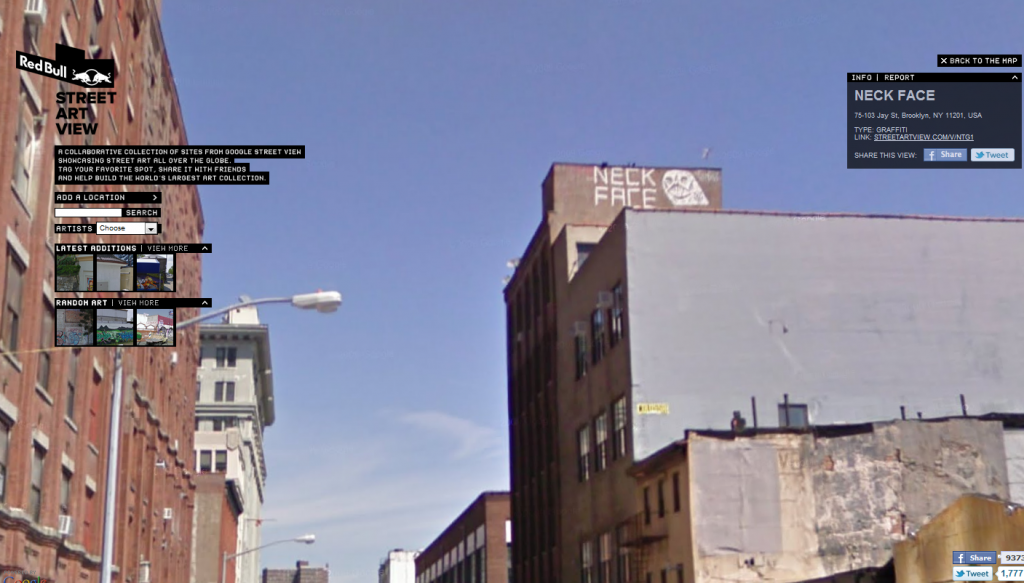 Cool tool that uses Google’s Street View to allow users to tag street art from around the globe. Check it out.
Cool tool that uses Google’s Street View to allow users to tag street art from around the globe. Check it out.
Expect more on street art and social media right here on Cyborgology in the near future.
 Cool tool that uses Google’s Street View to allow users to tag street art from around the globe. Check it out.
Cool tool that uses Google’s Street View to allow users to tag street art from around the globe. Check it out.
Expect more on street art and social media right here on Cyborgology in the near future.

I have terrible eyesight. Correctable medium myopia, with a heavy dose of astigmatism, keeps glasses on my head for 90% of my waking hours. (The remaining 10% is split between showers and punctuating dramatic one-liners.) My first eye doctor made a point to remind me of, upon each visit,how hard it is to repair a damaged eye. Thus, fueled by a fear of losing my eyesight, I always get excited about new technology for the eyeballs.
Researchers at The University of Michigan have successfully developed one of the first millimeter-scale computer systems. They aim to use the technology to monitor eye pressure in glaucoma patients, by inserting this tiny computer near the eye. Their overall goal for the technology however, has much broader implications. Dr. David Blaauw explains:
“The next big challenge is to achieve millimeter-scale systems, which have a host of new applications for monitoring our bodies, our environment and our buildings. Because they’re so small, you could manufacture hundreds of thousands on one wafer. There could be 10s to 100s of them per person and it’s this per capita increase that fuels the semiconductor industry’s growth.”
FlowingData posted this great infographic that shows how prostituion in Manhattan is increasingly dispersed. The Internet allows sex work to be less anchored by physicality when much of the process happens online. More analysis here.
This post originally appeared on one of our favorite blogs, OWNI, 18 February, 2011.
![]() “Internet Freedom? There’s no app for that!” Secretary of State Hillary Clinton’s speech on Tuesday concerning Internet freedom resembled an online activism campaign from Steve Jobs. A year after laying the foundation for the “21st Century Statecraft” (the catch phrase invented by spin doctors to define diplomacy connections), Clinton was once again promoting Internet freedom, though this time she chose her words more carefully.
“Internet Freedom? There’s no app for that!” Secretary of State Hillary Clinton’s speech on Tuesday concerning Internet freedom resembled an online activism campaign from Steve Jobs. A year after laying the foundation for the “21st Century Statecraft” (the catch phrase invented by spin doctors to define diplomacy connections), Clinton was once again promoting Internet freedom, though this time she chose her words more carefully.
At the beginning of 2010, her speech coincided with the incident between Google and China. This time, Clinton waited patiently for positive results from the Egyptian and Tunisian revolutions before launching into her diatribe. With a storytelling air, she started her speech by referring to the temporary Internet black-out initiated by Moubarak:
A few minutes after midnight on January 28, the Internet went dark across Egypt.
The power of social media to burrow dramatically into our everyday lives as well as the near ubiquity of new technologies such as mobile phones has forced us all to conceptualize the digital and the physical; the on- and off-line.
And some have a bias to see the digital and the physical as separate; what I am calling digital dualism. Digital dualists believe that the digital world is “virtual” and the physical world “real.” This bias motivates many of the critiques of sites like Facebook and the rest of the social web and I fundamentally think this digital dualism is a fallacy. Instead, I want to argue that the digital and physical are increasingly meshed, and want to call this opposite perspective that implodes atoms and bits rather than holding them conceptually separate augmented reality.
In a 2009 post titled “Towards Theorizing An Augmented Reality,” I discussed geo-tagging (think Foursquare or Facebook Places), street view, face recognition, the Wii controller and the fact that sites like Facebook both impact and are impacted by the physical world to argue that “digital and material realities dialectically co-construct each other.” This is opposed to the notion that the Internet is like the Matrix, where there is a “real” (Zion) that you leave when you enter the virtual space (the Matrix) -an outdated perspective as Facebook is increasingly real and our physical world increasingly digital.
I have used this perspective of augmentation to critque dualism when I see it. For instance, more...
 On the February 21, 2011 edition of The Colbert Report, there was a humorous but still telling segment (watch here) about former Congressional Senator and Representative Rick Santorum (R-PA). The segment detailed the effects of Dan Savage’s appeal to readers and followers to “Google bomb” then U.S. Senator Santorum in 2003 as a response to some of Santorum’s comments about homosexuality. In April of 2003, the Senator made several controversial statements that essentially compared homosexual acts to bestiality and incest, and stated he believed such acts to be a threat to society and the institution of the family (read excerpts from the interview here). Savage, author of the sex advice column “Savage Love,” appealed to his readers to come up with a definition of “Santorum” to memorialize the Senator’s comments as an act of protest.
On the February 21, 2011 edition of The Colbert Report, there was a humorous but still telling segment (watch here) about former Congressional Senator and Representative Rick Santorum (R-PA). The segment detailed the effects of Dan Savage’s appeal to readers and followers to “Google bomb” then U.S. Senator Santorum in 2003 as a response to some of Santorum’s comments about homosexuality. In April of 2003, the Senator made several controversial statements that essentially compared homosexual acts to bestiality and incest, and stated he believed such acts to be a threat to society and the institution of the family (read excerpts from the interview here). Savage, author of the sex advice column “Savage Love,” appealed to his readers to come up with a definition of “Santorum” to memorialize the Senator’s comments as an act of protest.
After settling on a definition, Savage created the website Santorum to promote the newly coined sexual neologism that meant a “frothy mixture of lube and fecal matter that is sometimes the byproduct of anal sex.” Over time, and many searches later, Savage’s website is to this day at the top of the results list when you Google “Santorum.” [In a nutshell, in order to Google bomb, or to inflate the ranking of a site under a particular query, you rely on people clicking on a specific link in the search results list and you rely upon other websites linking to a particular page using a specific anchor text. In this case, other websites linked to Savage’s site using the anchor text “Santorum” and many people clicked on his site when Googling the term.]
As funny as the story is, it raises important questions about the power over discourse given the new possibilities presented by the web. more...
Really cool visualization that integrates the data with its physical-world context. Reminiscent of the point that our world is increasingly an augmentation of the physical and the digital.
More images here.
- Facebook has conquered “the west” almost entirely, as well we South-East Asia and Oceania/Australia.
- Since it’s blocked in China, Facebook has pretty much zero market penetration in the world’s largest online market.
- Facebook is still weak in Japan, which is also one of the world’s largest online markets.
- Facebook is significantly less popular in much of Eastern Europe and Russia than in the rest of Europe.
Via Royal Pingdom.
 Maryland Morning host Sheilah Kast interviewed Cyborgology editors Nathan Jurgenson and PJ Rey about social media’s role in the recent protests in the Middle East. Here’s a brief synopsis:
Maryland Morning host Sheilah Kast interviewed Cyborgology editors Nathan Jurgenson and PJ Rey about social media’s role in the recent protests in the Middle East. Here’s a brief synopsis:
Citizens of countries throughout the Middle East were risking their lives to air grievances against their rulers long before Facebook founder Mark Zuckerberg even enrolled at Harvard nine years ago. This year, though, they’ve taken to the streets in unprecedented numbers, and they’re using social media to organize themselves.
The phrase “Twitter Revolution” is now being thrown around in the media. Is that overstating it? Or is social media fundamentally changing the dynamic between governments and their citizens?
Listen to the full interview: http://mdmorn.wordpress.com/2011/02/18/218112-social-media-in-the-middle-east/
I attended a viewing and panel discussion for the final episode of Jeopardy! IBM Challenge in which IBM’s Watson supercomputer beat reigning champions Ken Jennings and Brad Rutter in a 3-night challenge of standard Jeopardy! games. Check out my previous post to read more about the tech behind Watson and what IBM hopes to do with this impressive technology. This post will focus more on the public perception of Watson, and what it means to have a technology that is credited with producing very accurate conclusions based on complex data.
The panel discussion and viewing event was hosted at Rensselaer Polytechnic Institute in Troy, NY. In the interest of full disclosure- I am currently enrolled as an M.S./Ph.D student in RPI’s Science and Technology Studies Dept. It’s also worth noting that Principal Investigator, David Ferrucci; research scientist Chris Welty; and Senior Software Engineer Adam Lally, are all RPI alumni.
I asked a few RPI students, during the preceding reception, two questions: 1) what they foresaw as the first application of Watson, and 2) whether or not they were afraid of Watson. A group of three guys, Alex, Sean, and Thomas wanted to see this technology replace the Google algorithm or WebMD. Two women, Anna and Karen, repeated what they’d heard the previous night, that Watson would be a tool to deal with “information overload.” For the second question, all five students seemed puzzled. How could a machine that sorts data, be evil? more...